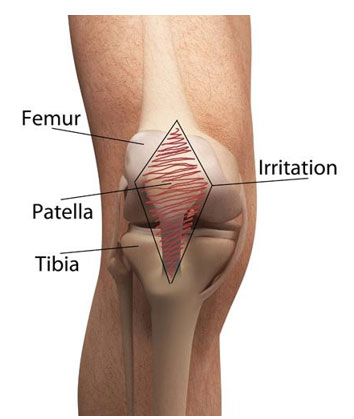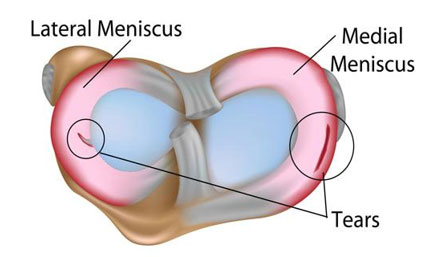RUNNER’S KNEE
Patellofemoral pain syndrome (PFPS) describes a painful irritation of the cartilage behind your kneecap. Although anyone may be affected, it is often the result of overuse of the knee in sports that require jumping or running, so we sometimes refer to it as “Runner’s knee”. PFPS is the most common cause of knee pain in the general population, affecting about 25% of adults.
One of the most common causes of PFPS is an imbalance between the muscles that help to guide your kneecap in its V-shaped groove at the end of your thigh bone. Repeatedly flexing and extending a misaligned kneecap leads to pain, swelling, and eventually arthritis. Misalignment of the kneecap (patella) is often secondary to problems in the hip and foot, especially weakness of your gluteal muscles or flat feet.
PFPS produces a dull pain behind the kneecap that is aggravated by prolonged walking, running, squatting, jumping, stair climbing, or arising from a seated position. The pain is often worse when walking downhill or downstairs. Longstanding misalignment can cause damage to the cartilage, which results in popping, grinding, or giving way.
Conservative care, like the type provided in this office, is successful at relieving your symptoms. Initially, it is important for you to minimize activities that provoke your pain, especially running, jumping, and activities that stress you into a “knock-kneed” position.

MENISCUS INJURY
The meniscus is a piece of tough, smooth, rubbery cartilage in the middle of your knee. Each of your knees has a meniscus on the inside (medial meniscus) and another on the outside (lateral meniscus). Each meniscus attaches to the top of your shinbone (tibia) and acts as a shock absorbent guide for your thigh bone (femur), which rests above.
Damage or tears to the meniscus are common. It affects males three or four times more often than females. Tears may occur at any age. In children and adolescents, the menisci are more durable and rubbery, so most injuries are “traumatic” because of a forceful twisting injury. As we age, our meniscus grows weaker, and “degenerative” tears become more likely, often resulting from simple or even unrecognized injuries.
Symptoms of meniscus injury depend on the type and severity of the damage. Patients sometimes hear a pop or snap at the time of initial injury. Patients with acute injuries may have difficulty bearing weight and may develop a limp. Stiffness is a common complaint. Clicking, catching, locking or giving-way is possible. Meniscus injuries are usually aggravated by movement and become uncomfortable with deep squatting.
Although some meniscus injuries may require surgery, most can be treated conservatively with the type of treatments provided in our office. Your age roughly correlates with the need for surgery. Approximately 2/3 of acute meniscal tears in children and adolescents will require surgery, but only about 1 in 20 patients over the age of 40 will require knee arthroscopy. Surgery is necessary more often in patients who cannot fully bend or straighten their leg, or whose knee locks and gets stuck in one place.
Patients who have undergone surgical repair of their meniscus are more likely to develop arthritis. These patients will also benefit from a well-planned home exercise program.
Credit: Information on this page provided by ChiroUp.

Dr. Matt has done wonders for me and I recommend him highly – I can’t say enough good things about him. Dr. Matt and staff are good people and will take great care of you.
I really love it here! They are very friendly and I feel Dr. Wilson is giving me great treatment! I also don’t feel pressured into coming back too frequently. The adjustments are great! Great office!
Very professional and in depth consultation. These people seem to genuinely care about people’s health and progress.
My family have used chiropractic and physical therapy services here and every one of us have had excellent outcomes. I wouldn’t go anywhere else these folks are as good as it gets.
Dr. Matthew squeezed me in on short notice and took very good care of me. He was very thorough and didn’t just adjust me and let me walk out. Amazing experience here and the receptionist is a sweetheart.
Dr. Matt and the entire staff have been GREAT! I went in for some issues I was having with my neck and back and Dr. Matt also helped me with some other issues I was having with my calf and shoulders that have made a HUGE improvement in my overall health and comfort.
I highly recommend using Dr. Matt!
